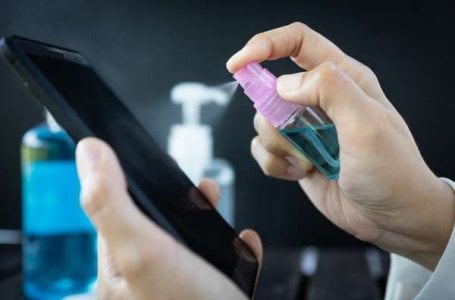Cleanliness calling: The shocking item Aussies never clean that's hiding more germs than your toilet!
- Replies 0
In a world where smartphones have become extensions of ourselves, one might wonder how often Australians take the time to clean these ubiquitous devices.
Recent insights shed light on the nation's smartphone hygiene habits, revealing a mix of diligence and neglect in the upkeep of these essential gadgets.
According to a recent study, your mobile phone harbours 10 times more bacteria than a typical toilet seat.
Despite the integral role mobile phones play in our everyday lives—they're our calendars, mini computers, cameras, and communication tools—a substantial number of Australians neglect appropriate hygiene when it comes to these devices.

A survey conducted by 9Honey showed a surprising 17 per cent of Aussies confessing to never cleaning their phones.
It's important to remember that each time we pick up our phones, we're potentially transferring countless E. coli and Staphylococcus bacteria particles—both of which can lead to severe health complications—across its surface.
Twenty-five per cent of the Australian respondents appear to be somewhat more conscious of their device hygiene, cleaning their phones once a month, while 26 per cent do so weekly.
However, even this might not be enough to fend off potential infections.
Microbiologist Primrose Freestone emphasised the necessity of regular phone cleaning—ideally, it should be done daily.
It is because even after meticulously cleaning your phone, it's crucial to recognise that germs can quickly resettle on its surface with each subsequent use or contact with different surfaces.
This aspect becomes especially significant if you or someone in your household has recently been unwell.
Freestone explained: 'Hands pick up bacteria and viruses all the time and are recognised as a route for acquiring infection. So too are the phones we touch. A number of studies conducted on the microbiological colonisation of mobile phones show that they can be contaminated with many different kinds of potentially pathogenic bacteria.'
Sixteen per cent of Australians surveyed are already leading by example, cleaning their devices with the frequency recommended by experts.
For an effective cleanse, use an alcohol wipe or moisten a microfibre cloth with some isopropyl alcohol, and give your phone a wipe-down.
Also, it's worth mentioning that using your phone in the bathroom or placing it on potentially unsanitary surfaces such as toilets only increases the likelihood of contamination.
Aside from your mobile phones, other everyday items might contain harmful bacteria.
Stay safe by reading more about them here.
 Are you part of the 17 per cent who have never cleaned their phones, or do you fall into the 16 per cent who diligently keep their phones germ-free? What are your tips for keeping your phone germ-free? Let us know in the comments below.
Are you part of the 17 per cent who have never cleaned their phones, or do you fall into the 16 per cent who diligently keep their phones germ-free? What are your tips for keeping your phone germ-free? Let us know in the comments below.
Recent insights shed light on the nation's smartphone hygiene habits, revealing a mix of diligence and neglect in the upkeep of these essential gadgets.
According to a recent study, your mobile phone harbours 10 times more bacteria than a typical toilet seat.
Despite the integral role mobile phones play in our everyday lives—they're our calendars, mini computers, cameras, and communication tools—a substantial number of Australians neglect appropriate hygiene when it comes to these devices.

A recent study found that mobile phones harbour 10 times more bacteria than toilet seats. Credits: Shutterstock
A survey conducted by 9Honey showed a surprising 17 per cent of Aussies confessing to never cleaning their phones.
It's important to remember that each time we pick up our phones, we're potentially transferring countless E. coli and Staphylococcus bacteria particles—both of which can lead to severe health complications—across its surface.
Twenty-five per cent of the Australian respondents appear to be somewhat more conscious of their device hygiene, cleaning their phones once a month, while 26 per cent do so weekly.
However, even this might not be enough to fend off potential infections.
Microbiologist Primrose Freestone emphasised the necessity of regular phone cleaning—ideally, it should be done daily.
It is because even after meticulously cleaning your phone, it's crucial to recognise that germs can quickly resettle on its surface with each subsequent use or contact with different surfaces.
This aspect becomes especially significant if you or someone in your household has recently been unwell.
Freestone explained: 'Hands pick up bacteria and viruses all the time and are recognised as a route for acquiring infection. So too are the phones we touch. A number of studies conducted on the microbiological colonisation of mobile phones show that they can be contaminated with many different kinds of potentially pathogenic bacteria.'
Sixteen per cent of Australians surveyed are already leading by example, cleaning their devices with the frequency recommended by experts.
For an effective cleanse, use an alcohol wipe or moisten a microfibre cloth with some isopropyl alcohol, and give your phone a wipe-down.
Also, it's worth mentioning that using your phone in the bathroom or placing it on potentially unsanitary surfaces such as toilets only increases the likelihood of contamination.
Aside from your mobile phones, other everyday items might contain harmful bacteria.
Stay safe by reading more about them here.
Key Takeaways
- A study found phones have ten times more bacteria than toilet seats.
- Seventeen per cent of Aussies admitted to never cleaning their mobile phones, which can harbour harmful bacteria like E. coli and Staphylococcus.
- Microbiologist Primrose Freestone recommended cleaning phones daily to prevent the spread of infections.
- To clean phones, it is suggested to use an alcohol wipe or isopropyl alcohol on a microfibre cloth, and to avoid using phones in germy areas.







